Organisational Behaviour Report: John Lewis Culture and Motivation
VerifiedAdded on 2023/01/12
|12
|4498
|41
Report
AI Summary
This report provides an analysis of organisational behaviour, focusing on the case of John Lewis. It examines how organisational culture, including power and task cultures, influences individual and team behaviour and performance. The report delves into organisational politics and the different types of power, such as reward and expert power, and their effects on employee motivation. Furthermore, it explores process and content theories of motivation, including expectancy theory and Maslow's hierarchy of needs, to understand how employees are motivated within the organisation. Finally, the report differentiates between effective and ineffective teams, highlighting the importance of communication and decision-making processes, and applies Tuckman's theory of team development to the context of John Lewis. The report aims to provide insights into the management of people within an organisation to achieve objectives and improve job satisfaction.
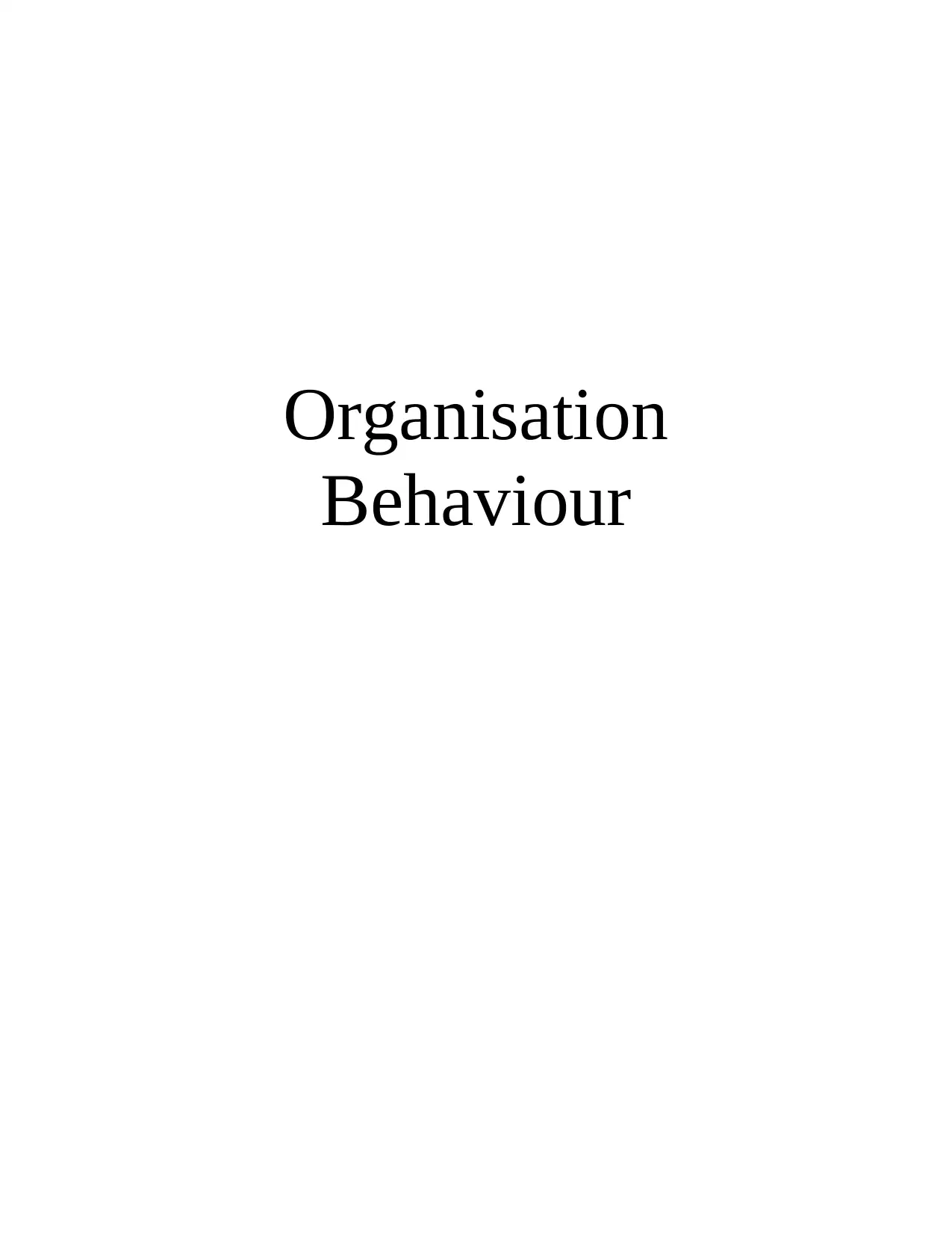
Organisation
Behaviour
Behaviour
Paraphrase This Document
Need a fresh take? Get an instant paraphrase of this document with our AI Paraphraser

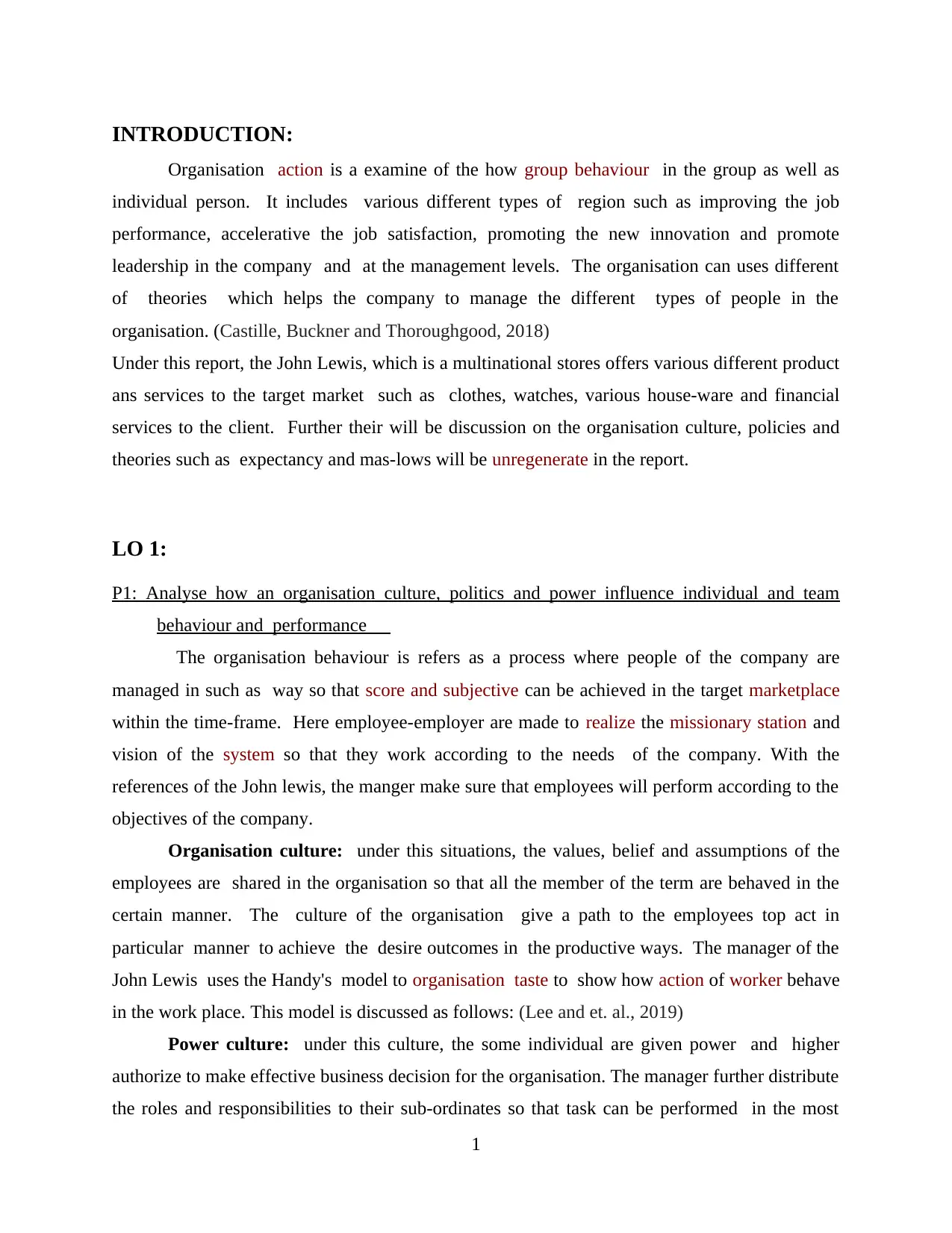
INTRODUCTION:
Organisation action is a examine of the how group behaviour in the group as well as
individual person. It includes various different types of region such as improving the job
performance, accelerative the job satisfaction, promoting the new innovation and promote
leadership in the company and at the management levels. The organisation can uses different
of theories which helps the company to manage the different types of people in the
organisation. (Castille, Buckner and Thoroughgood, 2018)
Under this report, the John Lewis, which is a multinational stores offers various different product
ans services to the target market such as clothes, watches, various house-ware and financial
services to the client. Further their will be discussion on the organisation culture, policies and
theories such as expectancy and mas-lows will be unregenerate in the report.
LO 1:
P1: Analyse how an organisation culture, politics and power influence individual and team
behaviour and performance
The organisation behaviour is refers as a process where people of the company are
managed in such as way so that score and subjective can be achieved in the target marketplace
within the time-frame. Here employee-employer are made to realize the missionary station and
vision of the system so that they work according to the needs of the company. With the
references of the John lewis, the manger make sure that employees will perform according to the
objectives of the company.
Organisation culture: under this situations, the values, belief and assumptions of the
employees are shared in the organisation so that all the member of the term are behaved in the
certain manner. The culture of the organisation give a path to the employees top act in
particular manner to achieve the desire outcomes in the productive ways. The manager of the
John Lewis uses the Handy's model to organisation taste to show how action of worker behave
in the work place. This model is discussed as follows: (Lee and et. al., 2019)
Power culture: under this culture, the some individual are given power and higher
authorize to make effective business decision for the organisation. The manager further distribute
the roles and responsibilities to their sub-ordinates so that task can be performed in the most
1
Organisation action is a examine of the how group behaviour in the group as well as
individual person. It includes various different types of region such as improving the job
performance, accelerative the job satisfaction, promoting the new innovation and promote
leadership in the company and at the management levels. The organisation can uses different
of theories which helps the company to manage the different types of people in the
organisation. (Castille, Buckner and Thoroughgood, 2018)
Under this report, the John Lewis, which is a multinational stores offers various different product
ans services to the target market such as clothes, watches, various house-ware and financial
services to the client. Further their will be discussion on the organisation culture, policies and
theories such as expectancy and mas-lows will be unregenerate in the report.
LO 1:
P1: Analyse how an organisation culture, politics and power influence individual and team
behaviour and performance
The organisation behaviour is refers as a process where people of the company are
managed in such as way so that score and subjective can be achieved in the target marketplace
within the time-frame. Here employee-employer are made to realize the missionary station and
vision of the system so that they work according to the needs of the company. With the
references of the John lewis, the manger make sure that employees will perform according to the
objectives of the company.
Organisation culture: under this situations, the values, belief and assumptions of the
employees are shared in the organisation so that all the member of the term are behaved in the
certain manner. The culture of the organisation give a path to the employees top act in
particular manner to achieve the desire outcomes in the productive ways. The manager of the
John Lewis uses the Handy's model to organisation taste to show how action of worker behave
in the work place. This model is discussed as follows: (Lee and et. al., 2019)
Power culture: under this culture, the some individual are given power and higher
authorize to make effective business decision for the organisation. The manager further distribute
the roles and responsibilities to their sub-ordinates so that task can be performed in the most
1
⊘ This is a preview!⊘
Do you want full access?
Subscribe today to unlock all pages.

Trusted by 1+ million students worldwide
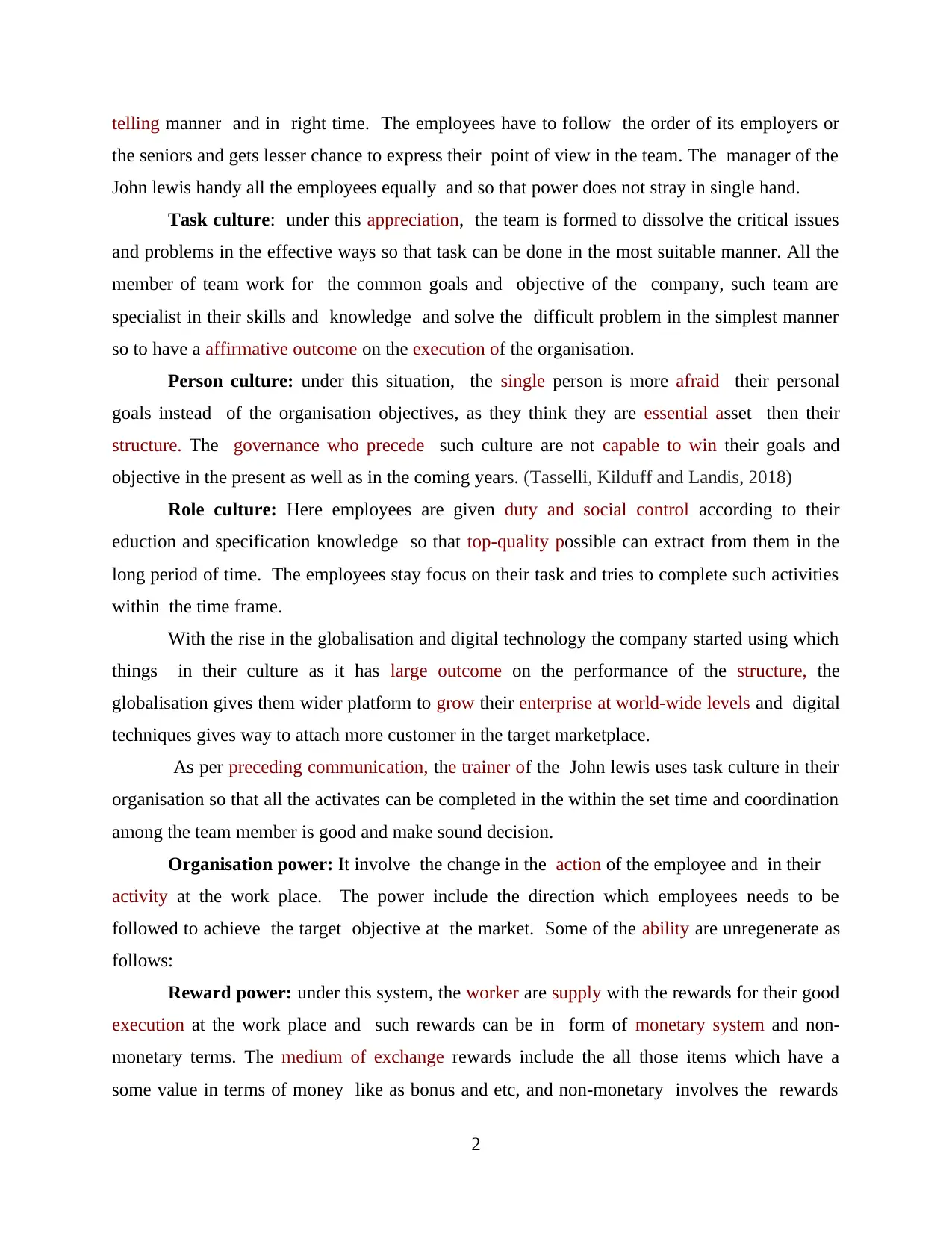
telling manner and in right time. The employees have to follow the order of its employers or
the seniors and gets lesser chance to express their point of view in the team. The manager of the
John lewis handy all the employees equally and so that power does not stray in single hand.
Task culture: under this appreciation, the team is formed to dissolve the critical issues
and problems in the effective ways so that task can be done in the most suitable manner. All the
member of team work for the common goals and objective of the company, such team are
specialist in their skills and knowledge and solve the difficult problem in the simplest manner
so to have a affirmative outcome on the execution of the organisation.
Person culture: under this situation, the single person is more afraid their personal
goals instead of the organisation objectives, as they think they are essential asset then their
structure. The governance who precede such culture are not capable to win their goals and
objective in the present as well as in the coming years. (Tasselli, Kilduff and Landis, 2018)
Role culture: Here employees are given duty and social control according to their
eduction and specification knowledge so that top-quality possible can extract from them in the
long period of time. The employees stay focus on their task and tries to complete such activities
within the time frame.
With the rise in the globalisation and digital technology the company started using which
things in their culture as it has large outcome on the performance of the structure, the
globalisation gives them wider platform to grow their enterprise at world-wide levels and digital
techniques gives way to attach more customer in the target marketplace.
As per preceding communication, the trainer of the John lewis uses task culture in their
organisation so that all the activates can be completed in the within the set time and coordination
among the team member is good and make sound decision.
Organisation power: It involve the change in the action of the employee and in their
activity at the work place. The power include the direction which employees needs to be
followed to achieve the target objective at the market. Some of the ability are unregenerate as
follows:
Reward power: under this system, the worker are supply with the rewards for their good
execution at the work place and such rewards can be in form of monetary system and non-
monetary terms. The medium of exchange rewards include the all those items which have a
some value in terms of money like as bonus and etc, and non-monetary involves the rewards
2
the seniors and gets lesser chance to express their point of view in the team. The manager of the
John lewis handy all the employees equally and so that power does not stray in single hand.
Task culture: under this appreciation, the team is formed to dissolve the critical issues
and problems in the effective ways so that task can be done in the most suitable manner. All the
member of team work for the common goals and objective of the company, such team are
specialist in their skills and knowledge and solve the difficult problem in the simplest manner
so to have a affirmative outcome on the execution of the organisation.
Person culture: under this situation, the single person is more afraid their personal
goals instead of the organisation objectives, as they think they are essential asset then their
structure. The governance who precede such culture are not capable to win their goals and
objective in the present as well as in the coming years. (Tasselli, Kilduff and Landis, 2018)
Role culture: Here employees are given duty and social control according to their
eduction and specification knowledge so that top-quality possible can extract from them in the
long period of time. The employees stay focus on their task and tries to complete such activities
within the time frame.
With the rise in the globalisation and digital technology the company started using which
things in their culture as it has large outcome on the performance of the structure, the
globalisation gives them wider platform to grow their enterprise at world-wide levels and digital
techniques gives way to attach more customer in the target marketplace.
As per preceding communication, the trainer of the John lewis uses task culture in their
organisation so that all the activates can be completed in the within the set time and coordination
among the team member is good and make sound decision.
Organisation power: It involve the change in the action of the employee and in their
activity at the work place. The power include the direction which employees needs to be
followed to achieve the target objective at the market. Some of the ability are unregenerate as
follows:
Reward power: under this system, the worker are supply with the rewards for their good
execution at the work place and such rewards can be in form of monetary system and non-
monetary terms. The medium of exchange rewards include the all those items which have a
some value in terms of money like as bonus and etc, and non-monetary involves the rewards
2
Paraphrase This Document
Need a fresh take? Get an instant paraphrase of this document with our AI Paraphraser

that does not have a money in the marketplace such as holiday schemes, social events and etc.
Expert power: here , the person who has a good skills and knowledge are likely to
provide a expert advice to its employees from time to time. The manager interpret it has the
knowledge is all-powerful in the system and such person are valuable by the company and tries
to take help from such employees in solving the problems in the effective manners. Here, the
opinions of the expert person are given more important then the employees in the organisation.
This power can be stepping stones to have a authorized power in the company in the long run.
According to the above, it can be stated that the organisation power have essentials consequence
on the presentation of the company, the rewards power is more important for the John lewis as
employees are motivated to give their best performance in the team.
Organisation politics: in every organisation there is need to have a effective and heath
politics that will help in achieving the common goals and objectives. Here roles and
responsibilities of the employees are stated to them so that every work according to the duties
and help in achieving the goals and objective in the accurate manner. The organisation must
have a positive and health politics so that all the team unit work for achieving the mission and
vision of the company in the longer period of time. (Organ, 2018)
LO 2:
P2: Examine the content and process theories of motivation in the organisation context.
The process theories of motivation refers to a way that prompt the individual to
performance in certain way to win the pre-determine mission and vision of the administration
in the present and in further years. This theory activity in motivating the worker to give their
best shot at the task and increase the productivity of the company. It also help in examining the
behaviour of the employee-employer from time to time and make effective changes in the team.
The Expectancy theory: According to this theory, employees are given rewards for
their best execution in the task. The motivation is a result of the choice made below the
organisation by increase the pleasure and decrease the pain in the management team. under this
theory, the score is to provide with the employees which the sense of belonging to the
organisation as rewards are given to them for their good inputs in the company. In the context
of John lewis, the manager focus on the improving the performance of the team by providing
3
Expert power: here , the person who has a good skills and knowledge are likely to
provide a expert advice to its employees from time to time. The manager interpret it has the
knowledge is all-powerful in the system and such person are valuable by the company and tries
to take help from such employees in solving the problems in the effective manners. Here, the
opinions of the expert person are given more important then the employees in the organisation.
This power can be stepping stones to have a authorized power in the company in the long run.
According to the above, it can be stated that the organisation power have essentials consequence
on the presentation of the company, the rewards power is more important for the John lewis as
employees are motivated to give their best performance in the team.
Organisation politics: in every organisation there is need to have a effective and heath
politics that will help in achieving the common goals and objectives. Here roles and
responsibilities of the employees are stated to them so that every work according to the duties
and help in achieving the goals and objective in the accurate manner. The organisation must
have a positive and health politics so that all the team unit work for achieving the mission and
vision of the company in the longer period of time. (Organ, 2018)
LO 2:
P2: Examine the content and process theories of motivation in the organisation context.
The process theories of motivation refers to a way that prompt the individual to
performance in certain way to win the pre-determine mission and vision of the administration
in the present and in further years. This theory activity in motivating the worker to give their
best shot at the task and increase the productivity of the company. It also help in examining the
behaviour of the employee-employer from time to time and make effective changes in the team.
The Expectancy theory: According to this theory, employees are given rewards for
their best execution in the task. The motivation is a result of the choice made below the
organisation by increase the pleasure and decrease the pain in the management team. under this
theory, the score is to provide with the employees which the sense of belonging to the
organisation as rewards are given to them for their good inputs in the company. In the context
of John lewis, the manager focus on the improving the performance of the team by providing
3

rewards for the efforts made in the state in the management team. This theory brings best from
the employees and make sure that they work at their full capabilities to succeed the goals and
objectives. (Carnevale, 2018)
The context theories of motivation: under this theory, the focus is given on the
fulfilling the basic needs of the employees at the work place so that work can be realised on time
and in the effective manner. Here employees needs and wants are completed in the organisation
so that they feel that they are part of the company and gives their inputs in the organisation and
helps in achieving the content and objective of the company in the long run. The manger and
leader has to look after the needs of its employees so that task can be done in the effective ways.
For explaining the basic needs Maslow's theory is discussed as follows:
Maslows hierarchy of needs theory: under this theory, the basic needs of the
employees are
fulling in their organisation so that worker stay motivated in the company for the longer period
of time. Such necessarily can be physiologic, safety, social and various another needs, which
are explain as follows:
physiological needs: under such needs , the base needs and wants of the employees such
as aerial, solid food, water and shelter , clothes and sleep. Here, employee are sensing after such
needs at the work place so that project can be accomplished within the set time-frame and
effectiveness can be maintain in the organisation for longer period of time.
Safety needs: under this needs, employees wants to feel the awareness of legal document
in the organisation it includes the personal and financial safety in the company which
employees wants to have in the management team.(Gagné, 2018)
Esteem needs: under this needs, the employees are successful to realised that their
honour is more important in the organisation. It can also to expressed that, individual self-respect
is given more essential in the task rather then gain it from another person in the organisation.
Self-actualization needs: under this conditions, worker are made to realise their full
potential in the team so that they can increase the inputs in the task in the organisation. Here
individual are superficial for the opportunities to improve their work in various task.
With the reference. The manager of the John lewis, the make sure that employees basic needs at
the work place need are fulfilled so that productivity of overall organisation can be achieve in
the long run.
4
the employees and make sure that they work at their full capabilities to succeed the goals and
objectives. (Carnevale, 2018)
The context theories of motivation: under this theory, the focus is given on the
fulfilling the basic needs of the employees at the work place so that work can be realised on time
and in the effective manner. Here employees needs and wants are completed in the organisation
so that they feel that they are part of the company and gives their inputs in the organisation and
helps in achieving the content and objective of the company in the long run. The manger and
leader has to look after the needs of its employees so that task can be done in the effective ways.
For explaining the basic needs Maslow's theory is discussed as follows:
Maslows hierarchy of needs theory: under this theory, the basic needs of the
employees are
fulling in their organisation so that worker stay motivated in the company for the longer period
of time. Such necessarily can be physiologic, safety, social and various another needs, which
are explain as follows:
physiological needs: under such needs , the base needs and wants of the employees such
as aerial, solid food, water and shelter , clothes and sleep. Here, employee are sensing after such
needs at the work place so that project can be accomplished within the set time-frame and
effectiveness can be maintain in the organisation for longer period of time.
Safety needs: under this needs, employees wants to feel the awareness of legal document
in the organisation it includes the personal and financial safety in the company which
employees wants to have in the management team.(Gagné, 2018)
Esteem needs: under this needs, the employees are successful to realised that their
honour is more important in the organisation. It can also to expressed that, individual self-respect
is given more essential in the task rather then gain it from another person in the organisation.
Self-actualization needs: under this conditions, worker are made to realise their full
potential in the team so that they can increase the inputs in the task in the organisation. Here
individual are superficial for the opportunities to improve their work in various task.
With the reference. The manager of the John lewis, the make sure that employees basic needs at
the work place need are fulfilled so that productivity of overall organisation can be achieve in
the long run.
4
⊘ This is a preview!⊘
Do you want full access?
Subscribe today to unlock all pages.

Trusted by 1+ million students worldwide
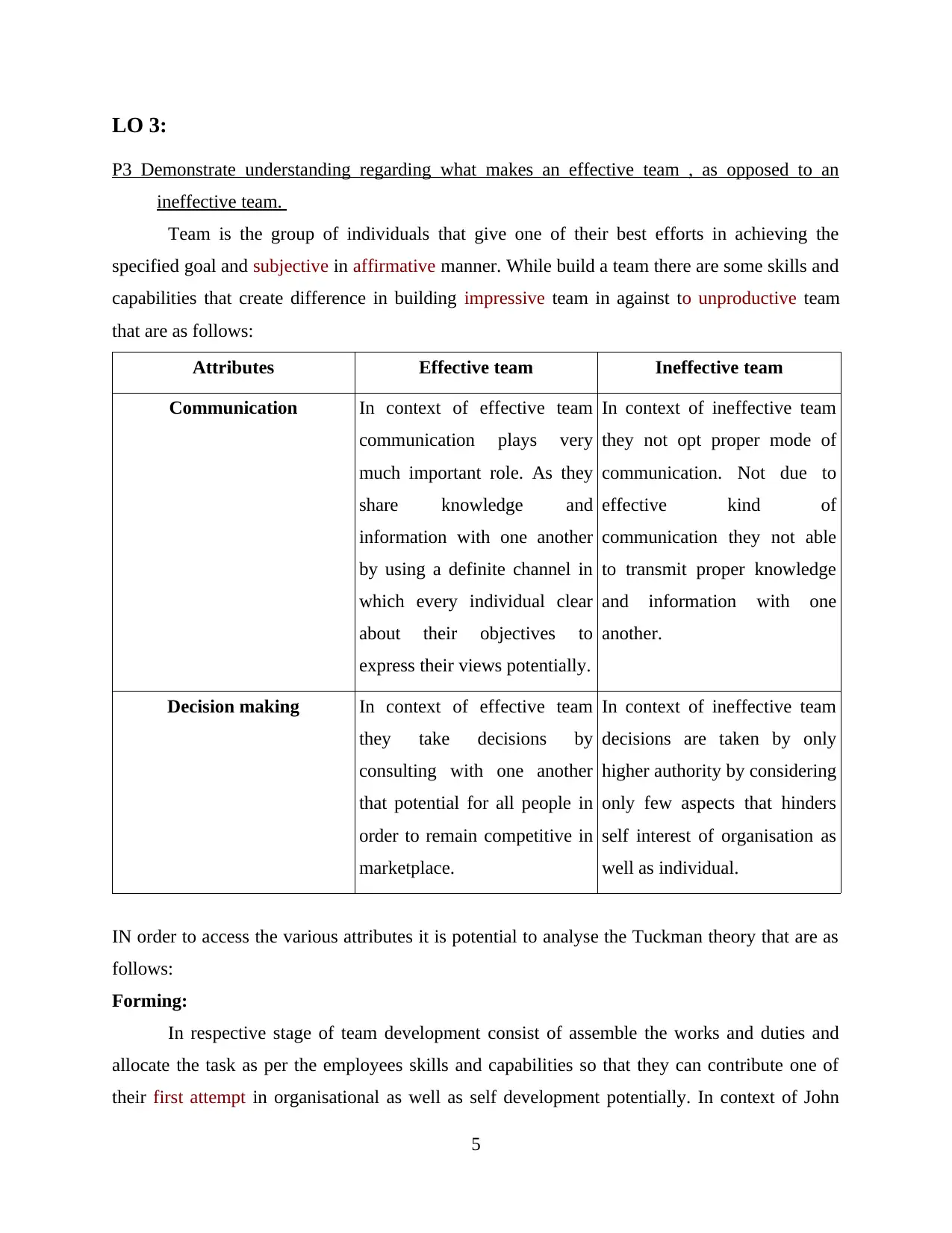
LO 3:
P3 Demonstrate understanding regarding what makes an effective team , as opposed to an
ineffective team.
Team is the group of individuals that give one of their best efforts in achieving the
specified goal and subjective in affirmative manner. While build a team there are some skills and
capabilities that create difference in building impressive team in against to unproductive team
that are as follows:
Attributes Effective team Ineffective team
Communication In context of effective team
communication plays very
much important role. As they
share knowledge and
information with one another
by using a definite channel in
which every individual clear
about their objectives to
express their views potentially.
In context of ineffective team
they not opt proper mode of
communication. Not due to
effective kind of
communication they not able
to transmit proper knowledge
and information with one
another.
Decision making In context of effective team
they take decisions by
consulting with one another
that potential for all people in
order to remain competitive in
marketplace.
In context of ineffective team
decisions are taken by only
higher authority by considering
only few aspects that hinders
self interest of organisation as
well as individual.
IN order to access the various attributes it is potential to analyse the Tuckman theory that are as
follows:
Forming:
In respective stage of team development consist of assemble the works and duties and
allocate the task as per the employees skills and capabilities so that they can contribute one of
their first attempt in organisational as well as self development potentially. In context of John
5
P3 Demonstrate understanding regarding what makes an effective team , as opposed to an
ineffective team.
Team is the group of individuals that give one of their best efforts in achieving the
specified goal and subjective in affirmative manner. While build a team there are some skills and
capabilities that create difference in building impressive team in against to unproductive team
that are as follows:
Attributes Effective team Ineffective team
Communication In context of effective team
communication plays very
much important role. As they
share knowledge and
information with one another
by using a definite channel in
which every individual clear
about their objectives to
express their views potentially.
In context of ineffective team
they not opt proper mode of
communication. Not due to
effective kind of
communication they not able
to transmit proper knowledge
and information with one
another.
Decision making In context of effective team
they take decisions by
consulting with one another
that potential for all people in
order to remain competitive in
marketplace.
In context of ineffective team
decisions are taken by only
higher authority by considering
only few aspects that hinders
self interest of organisation as
well as individual.
IN order to access the various attributes it is potential to analyse the Tuckman theory that are as
follows:
Forming:
In respective stage of team development consist of assemble the works and duties and
allocate the task as per the employees skills and capabilities so that they can contribute one of
their first attempt in organisational as well as self development potentially. In context of John
5
Paraphrase This Document
Need a fresh take? Get an instant paraphrase of this document with our AI Paraphraser
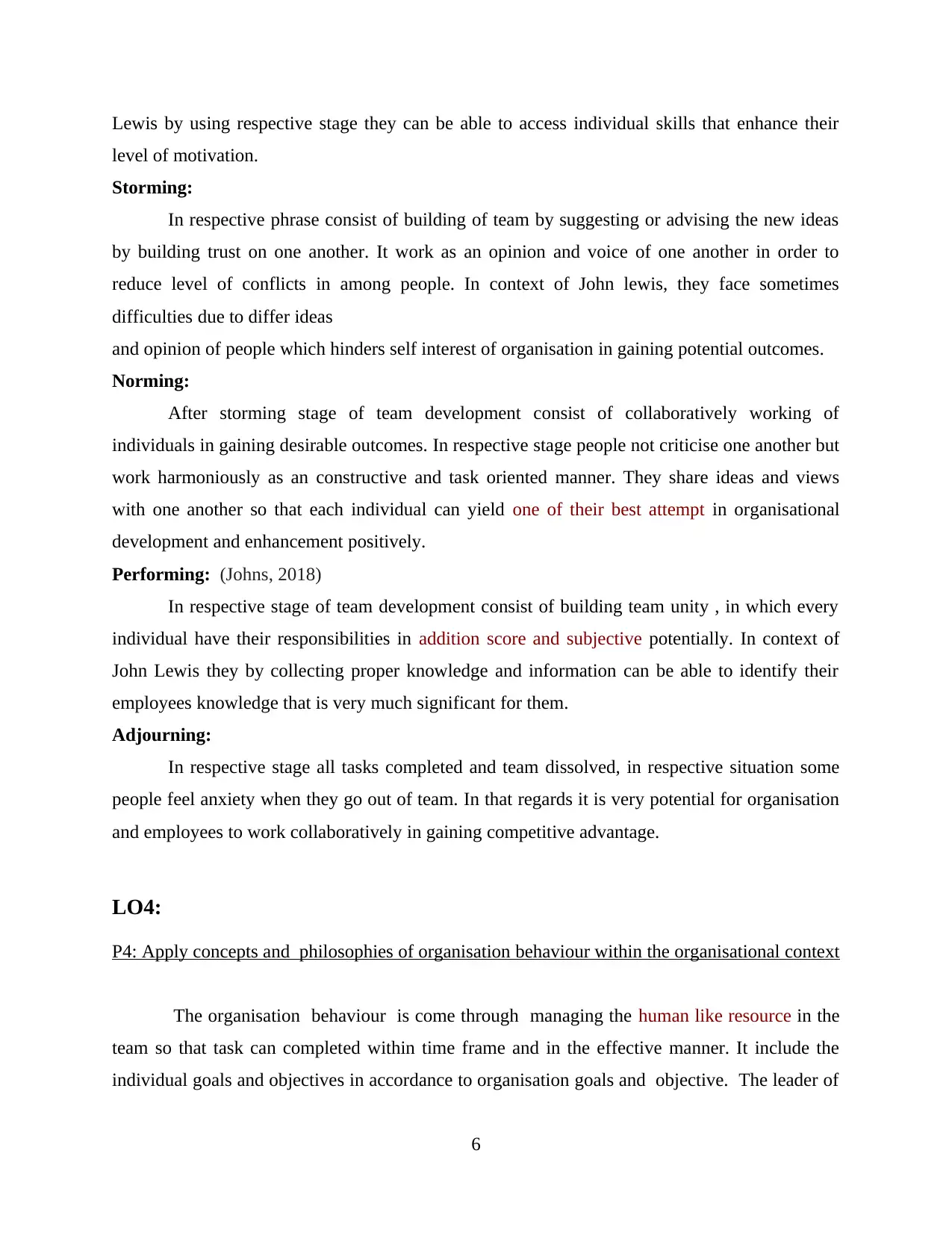
Lewis by using respective stage they can be able to access individual skills that enhance their
level of motivation.
Storming:
In respective phrase consist of building of team by suggesting or advising the new ideas
by building trust on one another. It work as an opinion and voice of one another in order to
reduce level of conflicts in among people. In context of John lewis, they face sometimes
difficulties due to differ ideas
and opinion of people which hinders self interest of organisation in gaining potential outcomes.
Norming:
After storming stage of team development consist of collaboratively working of
individuals in gaining desirable outcomes. In respective stage people not criticise one another but
work harmoniously as an constructive and task oriented manner. They share ideas and views
with one another so that each individual can yield one of their best attempt in organisational
development and enhancement positively.
Performing: (Johns, 2018)
In respective stage of team development consist of building team unity , in which every
individual have their responsibilities in addition score and subjective potentially. In context of
John Lewis they by collecting proper knowledge and information can be able to identify their
employees knowledge that is very much significant for them.
Adjourning:
In respective stage all tasks completed and team dissolved, in respective situation some
people feel anxiety when they go out of team. In that regards it is very potential for organisation
and employees to work collaboratively in gaining competitive advantage.
LO4:
P4: Apply concepts and philosophies of organisation behaviour within the organisational context
The organisation behaviour is come through managing the human like resource in the
team so that task can completed within time frame and in the effective manner. It include the
individual goals and objectives in accordance to organisation goals and objective. The leader of
6
level of motivation.
Storming:
In respective phrase consist of building of team by suggesting or advising the new ideas
by building trust on one another. It work as an opinion and voice of one another in order to
reduce level of conflicts in among people. In context of John lewis, they face sometimes
difficulties due to differ ideas
and opinion of people which hinders self interest of organisation in gaining potential outcomes.
Norming:
After storming stage of team development consist of collaboratively working of
individuals in gaining desirable outcomes. In respective stage people not criticise one another but
work harmoniously as an constructive and task oriented manner. They share ideas and views
with one another so that each individual can yield one of their best attempt in organisational
development and enhancement positively.
Performing: (Johns, 2018)
In respective stage of team development consist of building team unity , in which every
individual have their responsibilities in addition score and subjective potentially. In context of
John Lewis they by collecting proper knowledge and information can be able to identify their
employees knowledge that is very much significant for them.
Adjourning:
In respective stage all tasks completed and team dissolved, in respective situation some
people feel anxiety when they go out of team. In that regards it is very potential for organisation
and employees to work collaboratively in gaining competitive advantage.
LO4:
P4: Apply concepts and philosophies of organisation behaviour within the organisational context
The organisation behaviour is come through managing the human like resource in the
team so that task can completed within time frame and in the effective manner. It include the
individual goals and objectives in accordance to organisation goals and objective. The leader of
6
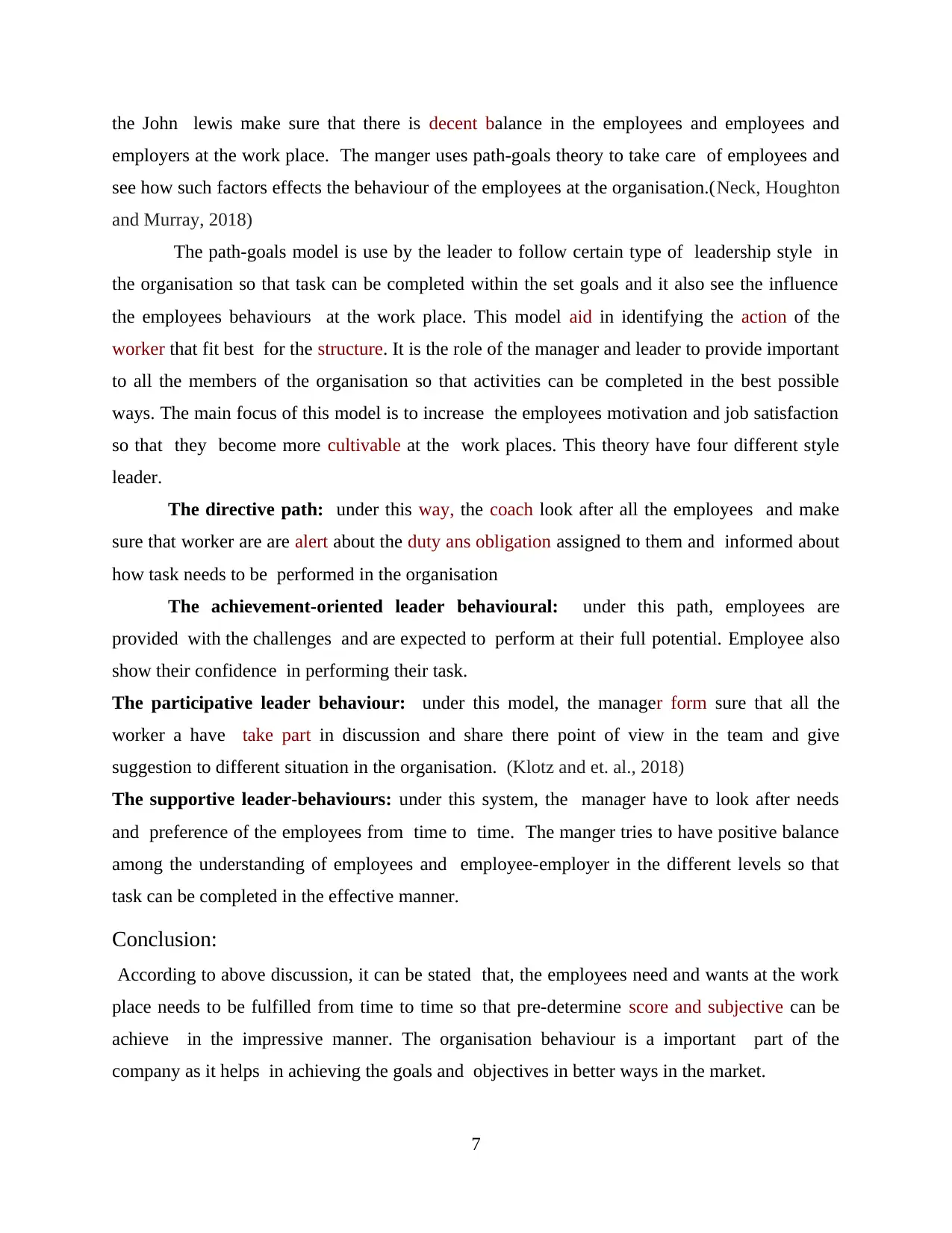
the John lewis make sure that there is decent balance in the employees and employees and
employers at the work place. The manger uses path-goals theory to take care of employees and
see how such factors effects the behaviour of the employees at the organisation.(Neck, Houghton
and Murray, 2018)
The path-goals model is use by the leader to follow certain type of leadership style in
the organisation so that task can be completed within the set goals and it also see the influence
the employees behaviours at the work place. This model aid in identifying the action of the
worker that fit best for the structure. It is the role of the manager and leader to provide important
to all the members of the organisation so that activities can be completed in the best possible
ways. The main focus of this model is to increase the employees motivation and job satisfaction
so that they become more cultivable at the work places. This theory have four different style
leader.
The directive path: under this way, the coach look after all the employees and make
sure that worker are are alert about the duty ans obligation assigned to them and informed about
how task needs to be performed in the organisation
The achievement-oriented leader behavioural: under this path, employees are
provided with the challenges and are expected to perform at their full potential. Employee also
show their confidence in performing their task.
The participative leader behaviour: under this model, the manager form sure that all the
worker a have take part in discussion and share there point of view in the team and give
suggestion to different situation in the organisation. (Klotz and et. al., 2018)
The supportive leader-behaviours: under this system, the manager have to look after needs
and preference of the employees from time to time. The manger tries to have positive balance
among the understanding of employees and employee-employer in the different levels so that
task can be completed in the effective manner.
Conclusion:
According to above discussion, it can be stated that, the employees need and wants at the work
place needs to be fulfilled from time to time so that pre-determine score and subjective can be
achieve in the impressive manner. The organisation behaviour is a important part of the
company as it helps in achieving the goals and objectives in better ways in the market.
7
employers at the work place. The manger uses path-goals theory to take care of employees and
see how such factors effects the behaviour of the employees at the organisation.(Neck, Houghton
and Murray, 2018)
The path-goals model is use by the leader to follow certain type of leadership style in
the organisation so that task can be completed within the set goals and it also see the influence
the employees behaviours at the work place. This model aid in identifying the action of the
worker that fit best for the structure. It is the role of the manager and leader to provide important
to all the members of the organisation so that activities can be completed in the best possible
ways. The main focus of this model is to increase the employees motivation and job satisfaction
so that they become more cultivable at the work places. This theory have four different style
leader.
The directive path: under this way, the coach look after all the employees and make
sure that worker are are alert about the duty ans obligation assigned to them and informed about
how task needs to be performed in the organisation
The achievement-oriented leader behavioural: under this path, employees are
provided with the challenges and are expected to perform at their full potential. Employee also
show their confidence in performing their task.
The participative leader behaviour: under this model, the manager form sure that all the
worker a have take part in discussion and share there point of view in the team and give
suggestion to different situation in the organisation. (Klotz and et. al., 2018)
The supportive leader-behaviours: under this system, the manager have to look after needs
and preference of the employees from time to time. The manger tries to have positive balance
among the understanding of employees and employee-employer in the different levels so that
task can be completed in the effective manner.
Conclusion:
According to above discussion, it can be stated that, the employees need and wants at the work
place needs to be fulfilled from time to time so that pre-determine score and subjective can be
achieve in the impressive manner. The organisation behaviour is a important part of the
company as it helps in achieving the goals and objectives in better ways in the market.
7
⊘ This is a preview!⊘
Do you want full access?
Subscribe today to unlock all pages.

Trusted by 1+ million students worldwide
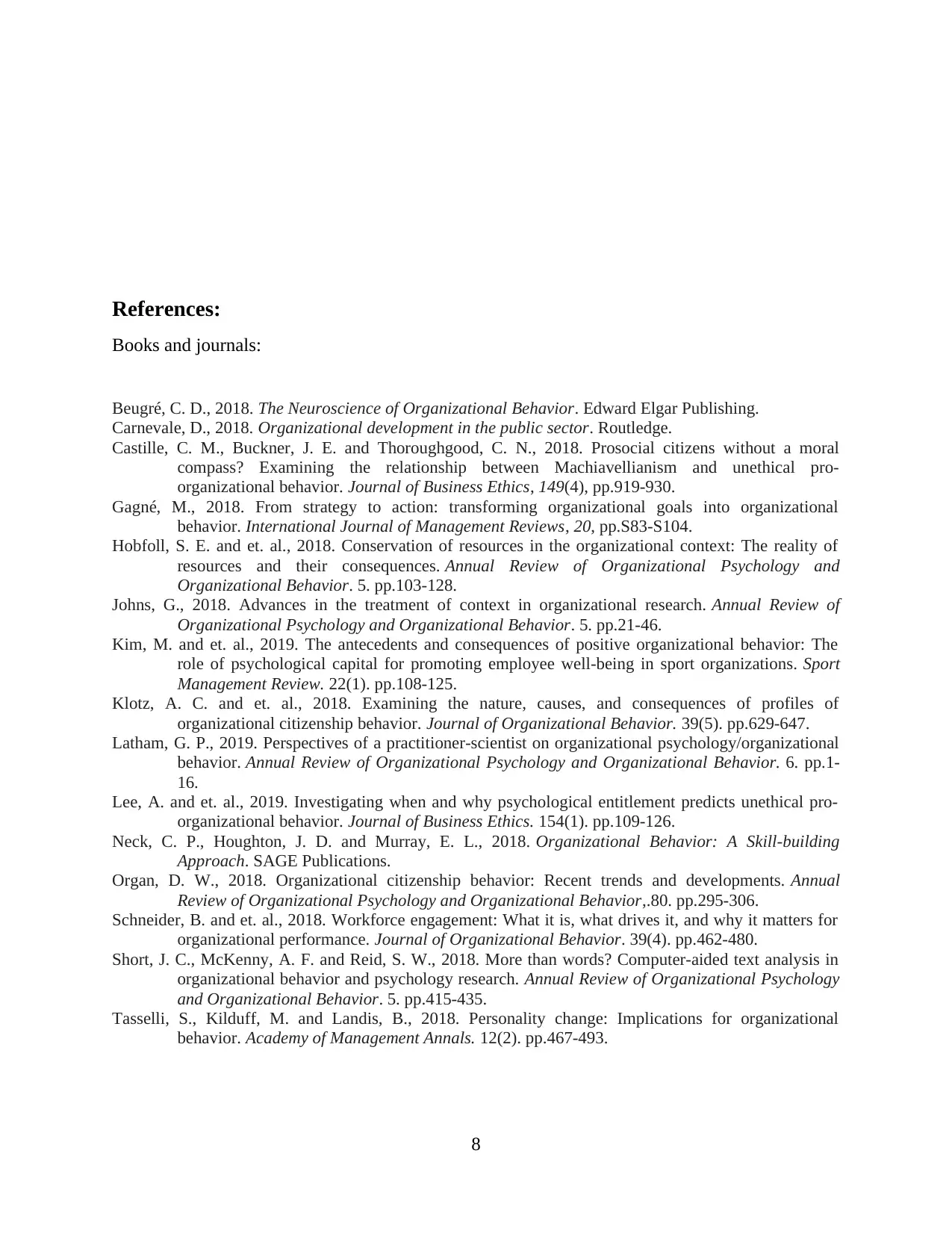
References:
Books and journals:
Beugré, C. D., 2018. The Neuroscience of Organizational Behavior. Edward Elgar Publishing.
Carnevale, D., 2018. Organizational development in the public sector. Routledge.
Castille, C. M., Buckner, J. E. and Thoroughgood, C. N., 2018. Prosocial citizens without a moral
compass? Examining the relationship between Machiavellianism and unethical pro-
organizational behavior. Journal of Business Ethics, 149(4), pp.919-930.
Gagné, M., 2018. From strategy to action: transforming organizational goals into organizational
behavior. International Journal of Management Reviews, 20, pp.S83-S104.
Hobfoll, S. E. and et. al., 2018. Conservation of resources in the organizational context: The reality of
resources and their consequences. Annual Review of Organizational Psychology and
Organizational Behavior. 5. pp.103-128.
Johns, G., 2018. Advances in the treatment of context in organizational research. Annual Review of
Organizational Psychology and Organizational Behavior. 5. pp.21-46.
Kim, M. and et. al., 2019. The antecedents and consequences of positive organizational behavior: The
role of psychological capital for promoting employee well-being in sport organizations. Sport
Management Review. 22(1). pp.108-125.
Klotz, A. C. and et. al., 2018. Examining the nature, causes, and consequences of profiles of
organizational citizenship behavior. Journal of Organizational Behavior. 39(5). pp.629-647.
Latham, G. P., 2019. Perspectives of a practitioner-scientist on organizational psychology/organizational
behavior. Annual Review of Organizational Psychology and Organizational Behavior. 6. pp.1-
16.
Lee, A. and et. al., 2019. Investigating when and why psychological entitlement predicts unethical pro-
organizational behavior. Journal of Business Ethics. 154(1). pp.109-126.
Neck, C. P., Houghton, J. D. and Murray, E. L., 2018. Organizational Behavior: A Skill-building
Approach. SAGE Publications.
Organ, D. W., 2018. Organizational citizenship behavior: Recent trends and developments. Annual
Review of Organizational Psychology and Organizational Behavior,.80. pp.295-306.
Schneider, B. and et. al., 2018. Workforce engagement: What it is, what drives it, and why it matters for
organizational performance. Journal of Organizational Behavior. 39(4). pp.462-480.
Short, J. C., McKenny, A. F. and Reid, S. W., 2018. More than words? Computer-aided text analysis in
organizational behavior and psychology research. Annual Review of Organizational Psychology
and Organizational Behavior. 5. pp.415-435.
Tasselli, S., Kilduff, M. and Landis, B., 2018. Personality change: Implications for organizational
behavior. Academy of Management Annals. 12(2). pp.467-493.
8
Books and journals:
Beugré, C. D., 2018. The Neuroscience of Organizational Behavior. Edward Elgar Publishing.
Carnevale, D., 2018. Organizational development in the public sector. Routledge.
Castille, C. M., Buckner, J. E. and Thoroughgood, C. N., 2018. Prosocial citizens without a moral
compass? Examining the relationship between Machiavellianism and unethical pro-
organizational behavior. Journal of Business Ethics, 149(4), pp.919-930.
Gagné, M., 2018. From strategy to action: transforming organizational goals into organizational
behavior. International Journal of Management Reviews, 20, pp.S83-S104.
Hobfoll, S. E. and et. al., 2018. Conservation of resources in the organizational context: The reality of
resources and their consequences. Annual Review of Organizational Psychology and
Organizational Behavior. 5. pp.103-128.
Johns, G., 2018. Advances in the treatment of context in organizational research. Annual Review of
Organizational Psychology and Organizational Behavior. 5. pp.21-46.
Kim, M. and et. al., 2019. The antecedents and consequences of positive organizational behavior: The
role of psychological capital for promoting employee well-being in sport organizations. Sport
Management Review. 22(1). pp.108-125.
Klotz, A. C. and et. al., 2018. Examining the nature, causes, and consequences of profiles of
organizational citizenship behavior. Journal of Organizational Behavior. 39(5). pp.629-647.
Latham, G. P., 2019. Perspectives of a practitioner-scientist on organizational psychology/organizational
behavior. Annual Review of Organizational Psychology and Organizational Behavior. 6. pp.1-
16.
Lee, A. and et. al., 2019. Investigating when and why psychological entitlement predicts unethical pro-
organizational behavior. Journal of Business Ethics. 154(1). pp.109-126.
Neck, C. P., Houghton, J. D. and Murray, E. L., 2018. Organizational Behavior: A Skill-building
Approach. SAGE Publications.
Organ, D. W., 2018. Organizational citizenship behavior: Recent trends and developments. Annual
Review of Organizational Psychology and Organizational Behavior,.80. pp.295-306.
Schneider, B. and et. al., 2018. Workforce engagement: What it is, what drives it, and why it matters for
organizational performance. Journal of Organizational Behavior. 39(4). pp.462-480.
Short, J. C., McKenny, A. F. and Reid, S. W., 2018. More than words? Computer-aided text analysis in
organizational behavior and psychology research. Annual Review of Organizational Psychology
and Organizational Behavior. 5. pp.415-435.
Tasselli, S., Kilduff, M. and Landis, B., 2018. Personality change: Implications for organizational
behavior. Academy of Management Annals. 12(2). pp.467-493.
8
Paraphrase This Document
Need a fresh take? Get an instant paraphrase of this document with our AI Paraphraser
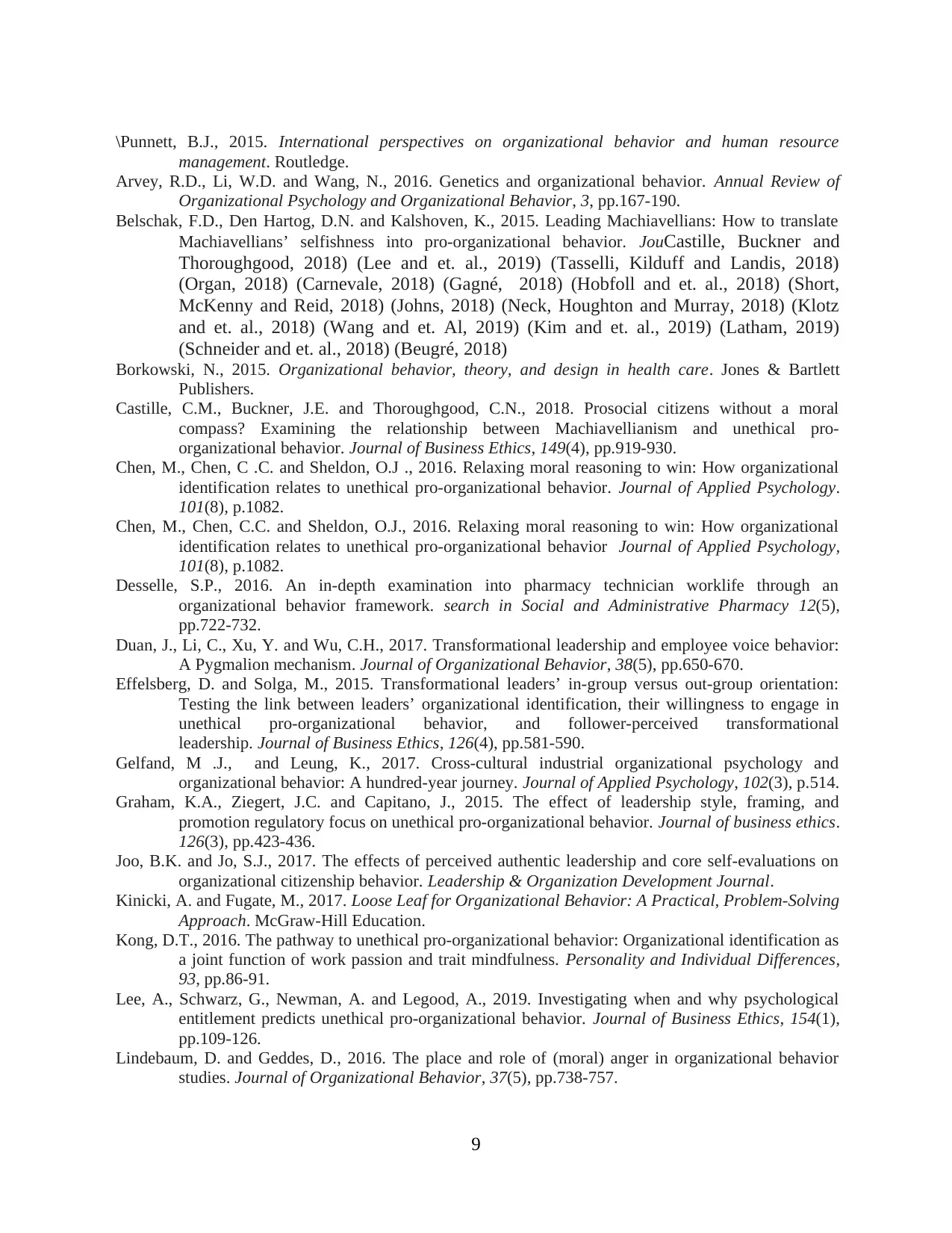
\Punnett, B.J., 2015. International perspectives on organizational behavior and human resource
management. Routledge.
Arvey, R.D., Li, W.D. and Wang, N., 2016. Genetics and organizational behavior. Annual Review of
Organizational Psychology and Organizational Behavior, 3, pp.167-190.
Belschak, F.D., Den Hartog, D.N. and Kalshoven, K., 2015. Leading Machiavellians: How to translate
Machiavellians’ selfishness into pro-organizational behavior. JouCastille, Buckner and
Thoroughgood, 2018) (Lee and et. al., 2019) (Tasselli, Kilduff and Landis, 2018)
(Organ, 2018) (Carnevale, 2018) (Gagné, 2018) (Hobfoll and et. al., 2018) (Short,
McKenny and Reid, 2018) (Johns, 2018) (Neck, Houghton and Murray, 2018) (Klotz
and et. al., 2018) (Wang and et. Al, 2019) (Kim and et. al., 2019) (Latham, 2019)
(Schneider and et. al., 2018) (Beugré, 2018)
Borkowski, N., 2015. Organizational behavior, theory, and design in health care. Jones & Bartlett
Publishers.
Castille, C.M., Buckner, J.E. and Thoroughgood, C.N., 2018. Prosocial citizens without a moral
compass? Examining the relationship between Machiavellianism and unethical pro-
organizational behavior. Journal of Business Ethics, 149(4), pp.919-930.
Chen, M., Chen, C .C. and Sheldon, O.J ., 2016. Relaxing moral reasoning to win: How organizational
identification relates to unethical pro-organizational behavior. Journal of Applied Psychology.
101(8), p.1082.
Chen, M., Chen, C.C. and Sheldon, O.J., 2016. Relaxing moral reasoning to win: How organizational
identification relates to unethical pro-organizational behavior Journal of Applied Psychology,
101(8), p.1082.
Desselle, S.P., 2016. An in-depth examination into pharmacy technician worklife through an
organizational behavior framework. search in Social and Administrative Pharmacy 12(5),
pp.722-732.
Duan, J., Li, C., Xu, Y. and Wu, C.H., 2017. Transformational leadership and employee voice behavior:
A Pygmalion mechanism. Journal of Organizational Behavior, 38(5), pp.650-670.
Effelsberg, D. and Solga, M., 2015. Transformational leaders’ in-group versus out-group orientation:
Testing the link between leaders’ organizational identification, their willingness to engage in
unethical pro-organizational behavior, and follower-perceived transformational
leadership. Journal of Business Ethics, 126(4), pp.581-590.
Gelfand, M .J., and Leung, K., 2017. Cross-cultural industrial organizational psychology and
organizational behavior: A hundred-year journey. Journal of Applied Psychology, 102(3), p.514.
Graham, K.A., Ziegert, J.C. and Capitano, J., 2015. The effect of leadership style, framing, and
promotion regulatory focus on unethical pro-organizational behavior. Journal of business ethics.
126(3), pp.423-436.
Joo, B.K. and Jo, S.J., 2017. The effects of perceived authentic leadership and core self-evaluations on
organizational citizenship behavior. Leadership & Organization Development Journal.
Kinicki, A. and Fugate, M., 2017. Loose Leaf for Organizational Behavior: A Practical, Problem-Solving
Approach. McGraw-Hill Education.
Kong, D.T., 2016. The pathway to unethical pro-organizational behavior: Organizational identification as
a joint function of work passion and trait mindfulness. Personality and Individual Differences,
93, pp.86-91.
Lee, A., Schwarz, G., Newman, A. and Legood, A., 2019. Investigating when and why psychological
entitlement predicts unethical pro-organizational behavior. Journal of Business Ethics, 154(1),
pp.109-126.
Lindebaum, D. and Geddes, D., 2016. The place and role of (moral) anger in organizational behavior
studies. Journal of Organizational Behavior, 37(5), pp.738-757.
9
management. Routledge.
Arvey, R.D., Li, W.D. and Wang, N., 2016. Genetics and organizational behavior. Annual Review of
Organizational Psychology and Organizational Behavior, 3, pp.167-190.
Belschak, F.D., Den Hartog, D.N. and Kalshoven, K., 2015. Leading Machiavellians: How to translate
Machiavellians’ selfishness into pro-organizational behavior. JouCastille, Buckner and
Thoroughgood, 2018) (Lee and et. al., 2019) (Tasselli, Kilduff and Landis, 2018)
(Organ, 2018) (Carnevale, 2018) (Gagné, 2018) (Hobfoll and et. al., 2018) (Short,
McKenny and Reid, 2018) (Johns, 2018) (Neck, Houghton and Murray, 2018) (Klotz
and et. al., 2018) (Wang and et. Al, 2019) (Kim and et. al., 2019) (Latham, 2019)
(Schneider and et. al., 2018) (Beugré, 2018)
Borkowski, N., 2015. Organizational behavior, theory, and design in health care. Jones & Bartlett
Publishers.
Castille, C.M., Buckner, J.E. and Thoroughgood, C.N., 2018. Prosocial citizens without a moral
compass? Examining the relationship between Machiavellianism and unethical pro-
organizational behavior. Journal of Business Ethics, 149(4), pp.919-930.
Chen, M., Chen, C .C. and Sheldon, O.J ., 2016. Relaxing moral reasoning to win: How organizational
identification relates to unethical pro-organizational behavior. Journal of Applied Psychology.
101(8), p.1082.
Chen, M., Chen, C.C. and Sheldon, O.J., 2016. Relaxing moral reasoning to win: How organizational
identification relates to unethical pro-organizational behavior Journal of Applied Psychology,
101(8), p.1082.
Desselle, S.P., 2016. An in-depth examination into pharmacy technician worklife through an
organizational behavior framework. search in Social and Administrative Pharmacy 12(5),
pp.722-732.
Duan, J., Li, C., Xu, Y. and Wu, C.H., 2017. Transformational leadership and employee voice behavior:
A Pygmalion mechanism. Journal of Organizational Behavior, 38(5), pp.650-670.
Effelsberg, D. and Solga, M., 2015. Transformational leaders’ in-group versus out-group orientation:
Testing the link between leaders’ organizational identification, their willingness to engage in
unethical pro-organizational behavior, and follower-perceived transformational
leadership. Journal of Business Ethics, 126(4), pp.581-590.
Gelfand, M .J., and Leung, K., 2017. Cross-cultural industrial organizational psychology and
organizational behavior: A hundred-year journey. Journal of Applied Psychology, 102(3), p.514.
Graham, K.A., Ziegert, J.C. and Capitano, J., 2015. The effect of leadership style, framing, and
promotion regulatory focus on unethical pro-organizational behavior. Journal of business ethics.
126(3), pp.423-436.
Joo, B.K. and Jo, S.J., 2017. The effects of perceived authentic leadership and core self-evaluations on
organizational citizenship behavior. Leadership & Organization Development Journal.
Kinicki, A. and Fugate, M., 2017. Loose Leaf for Organizational Behavior: A Practical, Problem-Solving
Approach. McGraw-Hill Education.
Kong, D.T., 2016. The pathway to unethical pro-organizational behavior: Organizational identification as
a joint function of work passion and trait mindfulness. Personality and Individual Differences,
93, pp.86-91.
Lee, A., Schwarz, G., Newman, A. and Legood, A., 2019. Investigating when and why psychological
entitlement predicts unethical pro-organizational behavior. Journal of Business Ethics, 154(1),
pp.109-126.
Lindebaum, D. and Geddes, D., 2016. The place and role of (moral) anger in organizational behavior
studies. Journal of Organizational Behavior, 37(5), pp.738-757.
9
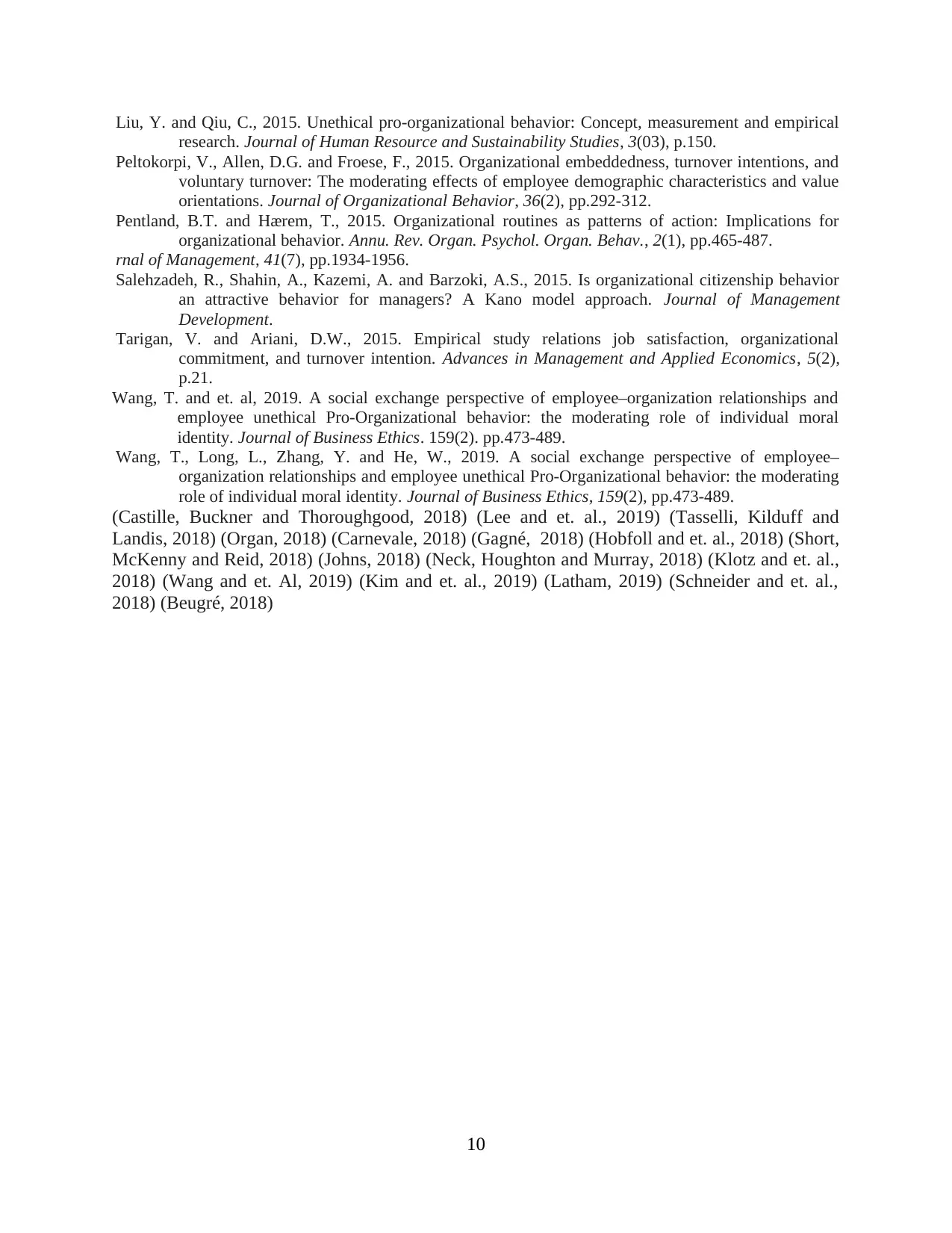
Liu, Y. and Qiu, C., 2015. Unethical pro-organizational behavior: Concept, measurement and empirical
research. Journal of Human Resource and Sustainability Studies, 3(03), p.150.
Peltokorpi, V., Allen, D.G. and Froese, F., 2015. Organizational embeddedness, turnover intentions, and
voluntary turnover: The moderating effects of employee demographic characteristics and value
orientations. Journal of Organizational Behavior, 36(2), pp.292-312.
Pentland, B.T. and Hærem, T., 2015. Organizational routines as patterns of action: Implications for
organizational behavior. Annu. Rev. Organ. Psychol. Organ. Behav., 2(1), pp.465-487.
rnal of Management, 41(7), pp.1934-1956.
Salehzadeh, R., Shahin, A., Kazemi, A. and Barzoki, A.S., 2015. Is organizational citizenship behavior
an attractive behavior for managers? A Kano model approach. Journal of Management
Development.
Tarigan, V. and Ariani, D.W., 2015. Empirical study relations job satisfaction, organizational
commitment, and turnover intention. Advances in Management and Applied Economics, 5(2),
p.21.
Wang, T. and et. al, 2019. A social exchange perspective of employee–organization relationships and
employee unethical Pro-Organizational behavior: the moderating role of individual moral
identity. Journal of Business Ethics. 159(2). pp.473-489.
Wang, T., Long, L., Zhang, Y. and He, W., 2019. A social exchange perspective of employee–
organization relationships and employee unethical Pro-Organizational behavior: the moderating
role of individual moral identity. Journal of Business Ethics, 159(2), pp.473-489.
(Castille, Buckner and Thoroughgood, 2018) (Lee and et. al., 2019) (Tasselli, Kilduff and
Landis, 2018) (Organ, 2018) (Carnevale, 2018) (Gagné, 2018) (Hobfoll and et. al., 2018) (Short,
McKenny and Reid, 2018) (Johns, 2018) (Neck, Houghton and Murray, 2018) (Klotz and et. al.,
2018) (Wang and et. Al, 2019) (Kim and et. al., 2019) (Latham, 2019) (Schneider and et. al.,
2018) (Beugré, 2018)
10
research. Journal of Human Resource and Sustainability Studies, 3(03), p.150.
Peltokorpi, V., Allen, D.G. and Froese, F., 2015. Organizational embeddedness, turnover intentions, and
voluntary turnover: The moderating effects of employee demographic characteristics and value
orientations. Journal of Organizational Behavior, 36(2), pp.292-312.
Pentland, B.T. and Hærem, T., 2015. Organizational routines as patterns of action: Implications for
organizational behavior. Annu. Rev. Organ. Psychol. Organ. Behav., 2(1), pp.465-487.
rnal of Management, 41(7), pp.1934-1956.
Salehzadeh, R., Shahin, A., Kazemi, A. and Barzoki, A.S., 2015. Is organizational citizenship behavior
an attractive behavior for managers? A Kano model approach. Journal of Management
Development.
Tarigan, V. and Ariani, D.W., 2015. Empirical study relations job satisfaction, organizational
commitment, and turnover intention. Advances in Management and Applied Economics, 5(2),
p.21.
Wang, T. and et. al, 2019. A social exchange perspective of employee–organization relationships and
employee unethical Pro-Organizational behavior: the moderating role of individual moral
identity. Journal of Business Ethics. 159(2). pp.473-489.
Wang, T., Long, L., Zhang, Y. and He, W., 2019. A social exchange perspective of employee–
organization relationships and employee unethical Pro-Organizational behavior: the moderating
role of individual moral identity. Journal of Business Ethics, 159(2), pp.473-489.
(Castille, Buckner and Thoroughgood, 2018) (Lee and et. al., 2019) (Tasselli, Kilduff and
Landis, 2018) (Organ, 2018) (Carnevale, 2018) (Gagné, 2018) (Hobfoll and et. al., 2018) (Short,
McKenny and Reid, 2018) (Johns, 2018) (Neck, Houghton and Murray, 2018) (Klotz and et. al.,
2018) (Wang and et. Al, 2019) (Kim and et. al., 2019) (Latham, 2019) (Schneider and et. al.,
2018) (Beugré, 2018)
10
⊘ This is a preview!⊘
Do you want full access?
Subscribe today to unlock all pages.

Trusted by 1+ million students worldwide
1 out of 12
Related Documents
Your All-in-One AI-Powered Toolkit for Academic Success.
+13062052269
info@desklib.com
Available 24*7 on WhatsApp / Email
![[object Object]](/_next/static/media/star-bottom.7253800d.svg)
Unlock your academic potential
Copyright © 2020–2026 A2Z Services. All Rights Reserved. Developed and managed by ZUCOL.





